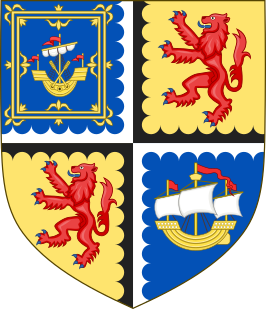
Clan Mackay is an ancient and once-powerful Highland Scottish clan from the far North of the Scottish Highlands, but with roots in the old Kingdom of Moray. They supported Robert the Bruce during the Wars of Scottish Independence in the 14th century. In the centuries that followed they were anti-Jacobite. The territory of the Clan Mackay consisted of the parishes of Farr, Tongue, Durness and Eddrachillis, and was known as Strathnaver, in the north-west of the county of Sutherland. However, it was not until 1829 that Strathnaver was considered part of Sutherland when the chief sold his lands to the Earls of Sutherland and the Highland Clearances then had dire consequences for the clan. In the 17th century the Mackay chief's territory had extended to the east to include the parish of Reay in the west of the neighbouring county of Caithness. The chief of the clan is Lord Reay and the lands of Strathnaver later became known as the Reay Country.

Clan Sutherland is a Highland Scottish clan whose traditional territory is the shire of Sutherland in the far north of Scotland. The chief of the clan was also the powerful Earl of Sutherland, however in the early 16th century this title passed through marriage to a younger son of the chief of Clan Gordon. The current chief is Alistair Sutherland who holds the title Earl of Sutherland.
Donald Mackay, 1st Lord Reay, 14th of Strathnaver was a Scottish soldier and member of Parliament. He played a prominent role in the Thirty Years' War, raising a regiment of 3,000 men, which served in both the Danish and Swedish forces. He was later an unwilling Covenanter. He was the fourteenth chief of Clan Mackay, a Highland Scottish clan.

The Battle of Alltan-Beath also known as the Battle of Ailtan-Beath was a Scottish clan battle said to have taken place in the year 1542 in the village of Knockarthur, in Sutherland, in the Scottish Highlands. It was fought between men of the Clan Mackay and men of the Clan Sutherland whose chiefs were the Gordon, Earls of Sutherland.

The Battle of Garbharry was a Scottish clan battle fought in the year 1555. It was the last battle to be fought between the Clan Mackay and Clan Sutherland. It was fought "beside the water of Garbharry", at "the foot of the hill called Beinn-mhor, in Berriedale". This has been recognised as the area around Garvery Hill, including Big and Little Garvery Burn, just south of Morven, where presumably some of the soldiers drowned.

The Battle of Leckmelm was a Scottish clan battle that took place in 1586, in the Scottish Highlands. It was fought between the Clan Gunn against the Clan Sutherland, Mackays of Aberach and the MacLeods of Assynt.

The Mackays of Aberach also known as the Clan Aberach are a Scottish family and a branch of the ancient Clan Mackay of the Scottish Highlands. They were the senior cadet branch of the Clan Mackay and were seated at Achness, in Strathnaver, which is in modern-day Sutherland. In Scottish Gaelic they are known as the Sleaght-ean Aberigh.
Huistean Du Mackay, 13th of Strathnaver, was the thirteenth chief of Clan Mackay, a Highland Scottish clan.
Angus Du Mackay, 7th of Strathnaver was the seventh chief of the Clan Mackay, a Highland Scottish clan. He is recorded in the 15th-century Scottish chronicle, Scotichronicon, as Enneas-en-Imprissi meaning Angus the Absolute due to his power of commanding 4000 men.
Alexander Gordon, Master of Sutherland (c.1505-1530), Scottish magnate, made Earl of Sutherland in 1527.
Iye Du Mackay, 12th of Strathnaver, was the chief of the Clan Mackay, a Highland Scottish clan, from 1550 to 1572.

The Mackays of Scoury were a minor noble Scottish family and a branch of the ancient Clan Mackay, a Highland Scottish clan. They were seated at Scourie Castle, in Scourie, in the parish of Eddrachillis, county of Sutherland. However, Scourie was part of the Mackay chief's province of “Strathnaver” until it was sold to the Earl of Sutherland in 1829.
Iye Mackay, 4th of Strathnaver was the chief of the ancient Clan Mackay, a Scottish clan of the Scottish Highlands. He was murdered along with his eldest son Donald at Dingwall Castle during a feud with the Earl of Sutherland, chief of the Clan Sutherland.
Donald Mackay, 5th of Strathnaver, was the fifth chief of the ancient Clan Mackay, a Scottish clan of the Scottish Highlands.
Iye Roy Mackay, 10th of Strathnaver, was the tenth chief of the ancient Clan Mackay, a Scottish clan of the Scottish Highlands.
John Mackay, 11th of Strathnaver, was the eleventh chief of the ancient Clan Mackay, a Scottish clan of the Scottish Highlands.
Donald Mackay, 11th of Strathnaver, was the eleventh chief of the ancient Clan Mackay, a Scottish clan of the Scottish Highlands.
Hugh Mackay of Bighouse was a Scottish noble, soldier and a member of the Clan Mackay, a Scottish clan of the Scottish Highlands.
George Mackay, 3rd Lord Reay (1678–1748), was a Scottish noble and chief of the Clan Mackay, a Scottish clan of the Scottish Highlands. During his life the Glorious Revolution took place which directly affected his family and estate, and during his chiefdom he served the British-Hanoverian Government during the Jacobite rising of 1715 and the Jacobite rising of 1745.

George Sinclair was a Scottish nobleman, the 5th Earl of Caithness and chief of the Clan Sinclair, a Scottish clan based in northern Scotland.








